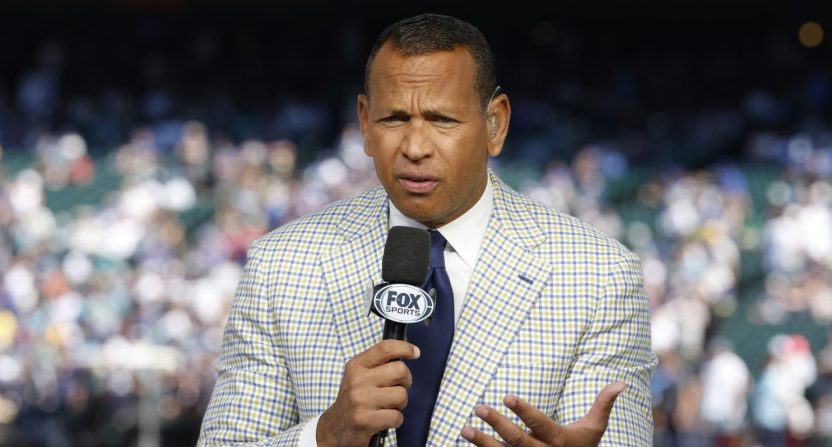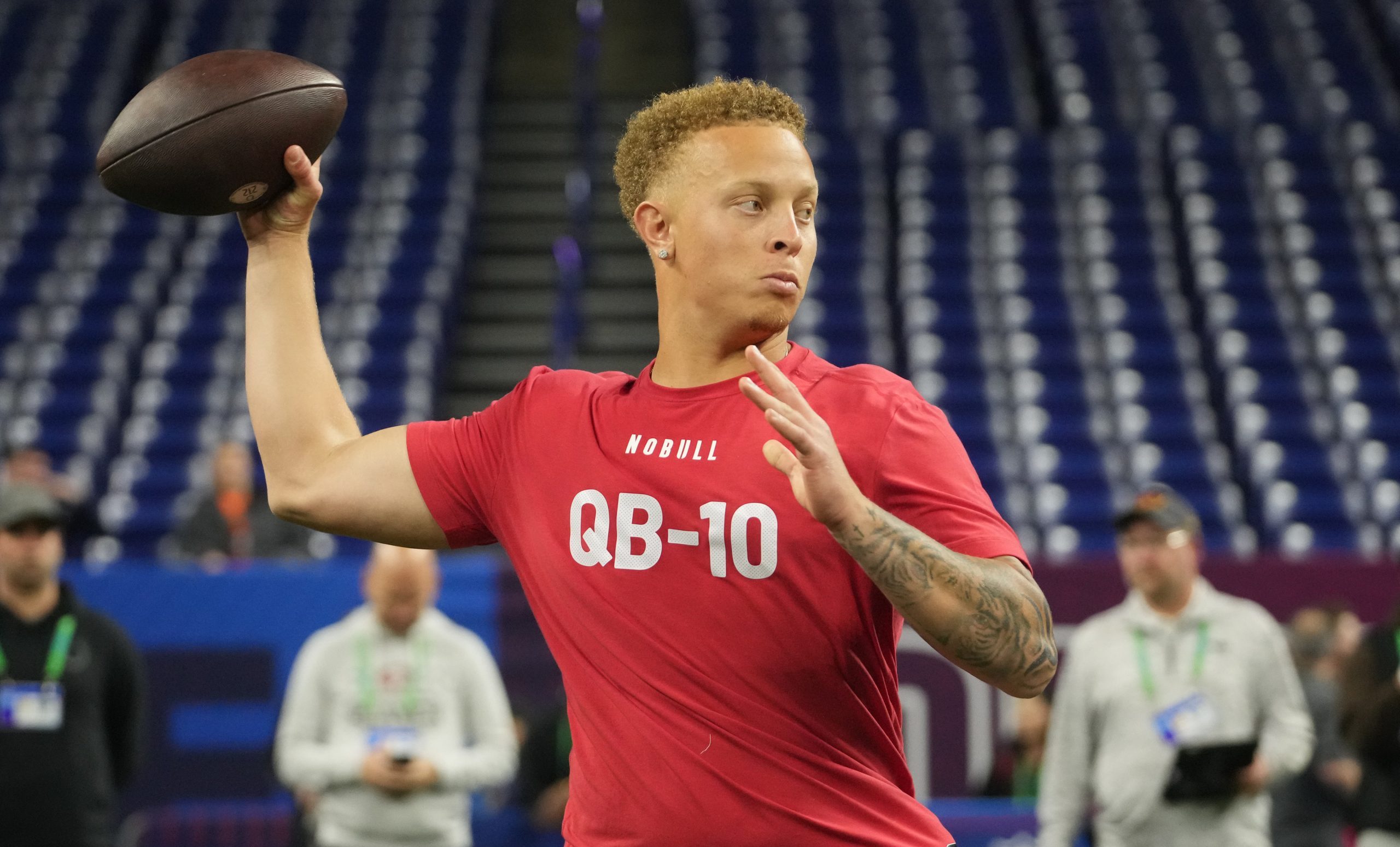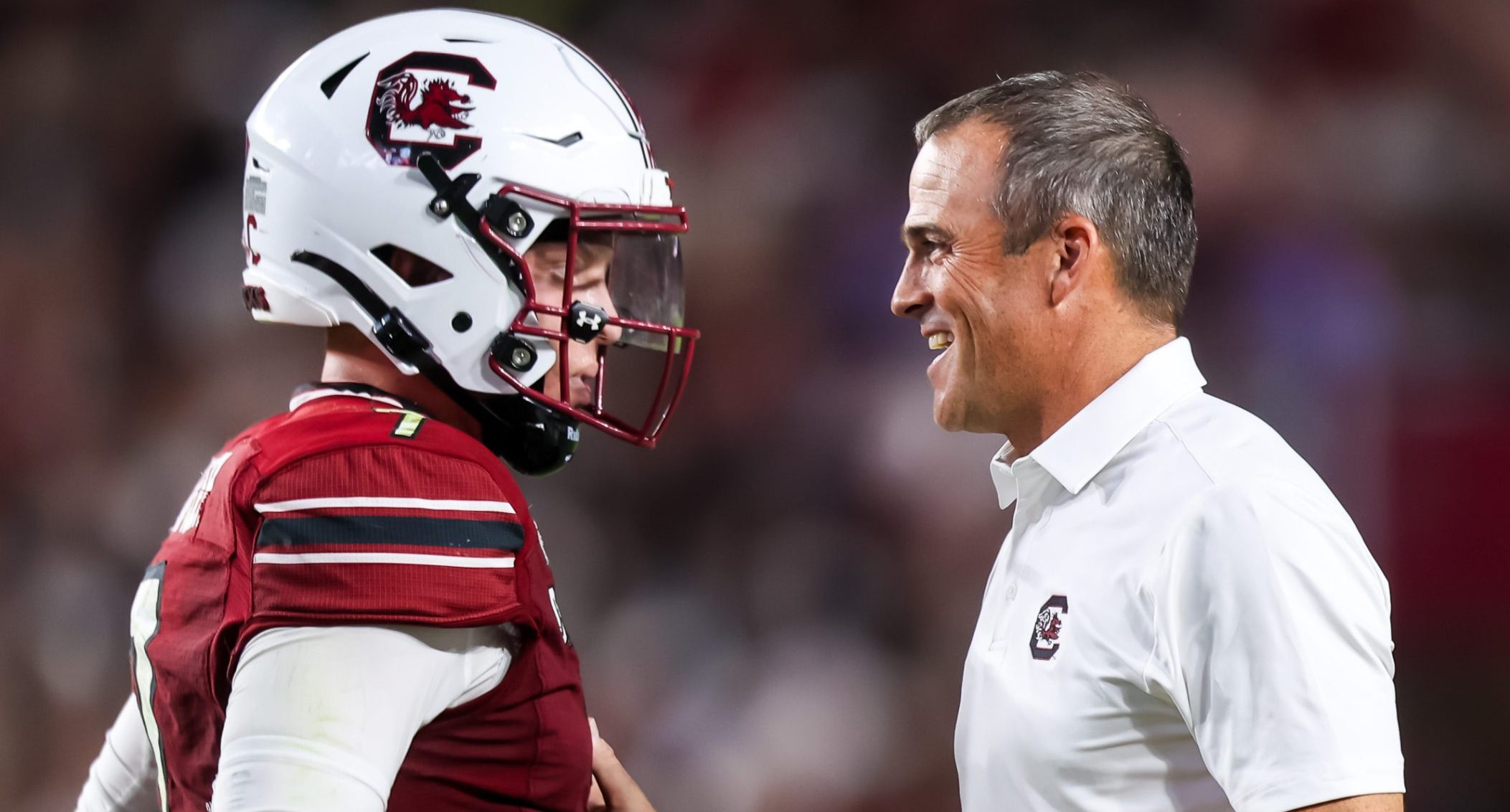Though it’s been overshadowed by other, arguably more impactful happenings (fallout from conference realignment, Apple going all in on Lionel Messi, etc.), one major development in sports media has been Fox’s ongoing pursuit of Alex Rodriguez, reportedly nearing a deal that would make him the highest-paid announcer in baseball.
The former Yankee has kept plenty busy in his post-playing career, maintaining a presence on Fox’s pre and postgame shows while co-hosting ESPN’s Sunday Night Baseball simulcast alongside YES veteran Michael Kay. Tall, handsome and immaculately dressed, A-Rod may look the part, though his bland, paint-by-numbers analysis leaves much to be desired, offering little value to listeners seeking a fresh perspective on America’s pastime. Yet his rise continues, occupying precious real estate as one of the most sought-after voices in his profession.
While Rodriguez has yet to distinguish himself as a unique or engaging on-air personality, what he lacks in broadcasting polish he more than makes up for in celebrity. Fame—or infamy, depending on your perception of his controversial past as one of baseball’s most polarizing figures—shouldn’t equate to credibility, though it does for A-Rod, elevated by the all-seeing eyes of TMZ and other tabloids that chronicle his every move. Qualified or not, Rodriguez is here to stay and so is the trend toward A-list analysts, with networks increasingly populating their booths with splash hires, prioritizing spectacle over substance.
A pariah throughout his playing career, it’s a wonder how much mileage A-Rod has gotten out of his pearly whites (he must share a dentist with Rex Ryan), inexplicably propped up by his employers at Fox and ESPN. As industry standards loosen, prioritizing ad dollars over journalism, network executives too often mistake star-power for quality, operating under the flawed assumption that Rodriguez, by virtue of his immense celebrity, will attract more viewers.
Desperate to rehab his public image, Rodriguez is entitled to seek our forgiveness. But somewhere along his path to redemption, A-Rod devolved into a corporate mascot, insulting our collective intelligence by minimizing the PED scandal that tarnished his legacy. Seeing a disgraced slugger command so much influence reeks of privilege, though those optics wouldn’t be nearly as problematic if Rodriguez were even remotely interesting or informative.
In a world of nepo babies coasting off their parents’ accomplishments, all of us acknowledge—with begrudging acceptance—the perks of being obscenely wealthy, cutting the line while others scavenge for whatever scraps remain. In a perfect world, sports media would function as a meritocracy, but we all know it doesn’t work that way. Celebrity culture is rampant. It’s why any A-lister with a working microphone can burp out a podcast and get ratings, the same way George Clooney can slap his name on a tequila label and make millions.
Take Greg Olsen, for example. The former Bears and Panthers tight end has quickly emerged as one of the industry’s rising stars, seamlessly replacing Troy Aikman as Fox’s lead analyst on NFL broadcasts. Charming, enthusiastic, confident and most of all, knowledgeable, Olsen is everything you could ask for in a color commentator. Naturally, he’s being replaced, ceding his chair to Tom Brady upon his debut in 2024.
Imagine being demoted when the only crime you’re guilty of is not being the greatest quarterback of all-time. That’s not to say Brady won’t be excellent. His unparalleled work ethic and attention to detail should serve him well in his transition to broadcasting. But even if Fox’s Brady experiment works, it sure is a raw deal for Olsen, who deserved a better fate than having his dream job farmed out to a novice broadcaster—albeit one with enough postseason hardware to fill a museum—cuckolded as thoroughly as William H. Macy in Boogie Nights (and we all know how that turned out).
Former ESPN executive John Skipper once referred to Brady as a “trophy,” the ultimate luxury buy for a network drowning in broadcast rights money. Handing Brady a blank check may not be the most efficient or practical use of Fox’s resources, but it’s preferable to developing their own talent, borrowing a familiar Hollywood trope by throwing money at a situation and hoping all their problems magically float away. It’s a lazy solution, treating consumers as shallow and impressionable, unable to make their own viewing choices without a grinning ex-athlete, usually outfitted in hair plugs and veneers, showing them the way.
We’re all complicit in the proliferation of celebrity hero worship. For instance, while scrolling the depths of Netflix’s endless sea of content offerings, are you more likely to stop on a niche arthouse flick or a summer blockbuster helmed by a known director and a proven stable of action stars (Channing Tatum, Keanu Reaves, etc) with names and faces plastered over billboards in Times Square? On some level, all of us are reluctant to change, preferring the comfort food of A-Rod and Brady, conveniently disregarding their technical ability while dooming Olsen (a lowly three-time Pro Bowler) and the middle class of retired athletes to a dreaded existence as prisoners trapped in broadcast purgatory.
There have been exceptions—overachievers like Nate Burleson, a journeyman receiver who first rose to prominence on Good Morning Football, a foot in the door that led to his breakout role as the cohost of CBS Mornings. Former Ravens and Broncos cornerback Domonique Foxworth has enjoyed a similar reinvention at ESPN, becoming a fixture on shows like Get Up and First Take. Still, those examples are few and far between, with most of those opportunities falling at the feet of household names, saving networks the hassle of organically growing an audience.
Fox might be the most common perpetrator, though the stunt hiring phenomenon isn’t going away, emerging as the new industry standard in a morally ambiguous entertainment realm that rewards fame over skill and experience. The frantic musical chairs of filling panelist seats on studio shows like NFL Today and Sunday Countdown has always been a popularity contest akin to the “cool” table in high-school cafeterias, though it didn’t used to be this blatant.
Let’s face it. A Monday Night simulcast wouldn’t work with Jim Sorgi and Brock Huard. You need the Manning brothers, and even that’s not enough to satisfy ESPN’s star quota, requiring celebrity cameos from Snoop Dogg, Barack Obama, Kevin Hart and Dwayne “The Rock” Johnson, among other high-profile guests. Does it make for good television? Rarely. But if the goal is to cram as many big names onto a marquee as possible, then mission accomplished.
Lost in all this is that football is such an unrelenting juggernaut that it barely matters who’s in the booth. The product sells itself. Are fans flocking to CBS for Tony Romo’s analysis or are they merely scratching an itch, eager to get their football fix after days of feverish anticipation? It’s probably the latter, making it all the more inexplicable that Fox would spend a fortune on Brady ($375 million) when half their viewers are watching the game on mute anyway, busy checking their phones for fantasy updates or sweating the “Witching Hour” on Red Zone.
So why do it? Because they can. CBS didn’t hire J.J. Watt because he’s an articulate football mind. He’s a status symbol, a hood ornament for a network making hand over fist in broadcast rights money. The same could be said of ESPN rolling out the red carpet for Pat McAfee or Amazon pairing Al Michaels with Kirk Herbstreit on Thursday Night Football despite their obvious lack of chemistry (they also failed to account for Herbstreit’s hectic travel schedule, shuttling between TNF and College GameDay).
Though ESPN might frame it differently, hiring McAfee was an admission of defeat, deciding, after years of trial and error, to outsource their afternoon programming, just as they did a year earlier by handing the Monday Night reins to Joe Buck and Troy Aikman. Developing talent used to be a source of pride, but with so much at stake in a changing industry, ESPN no longer has the luxury of breeding their own stars, hoping the novelty of big-name athletes and announcers will distract from their other shortcomings.
If nothing else, this demonstrates how networks, in their lust for viral traffic, continue to prioritize the wrong things, winning the news cycle by collecting as many big names as possible and hoping the rest will work itself out. Brady could be a savior for Fox, or he could be a colossal bust like Drew Brees, a legendary quarterback who couldn’t cut it on NBC.
What does it all mean? Maybe nothing, though it’s certainly not the most sophisticated approach to building a media empire, conflating cultural relevance to quality entertainment in a crowded content space where image has become almost as important as the product itself. The more jarring possibility, however, is that we actually WANT this, hopelessly addicted to the most potent drug of all—fame and celebrity.







